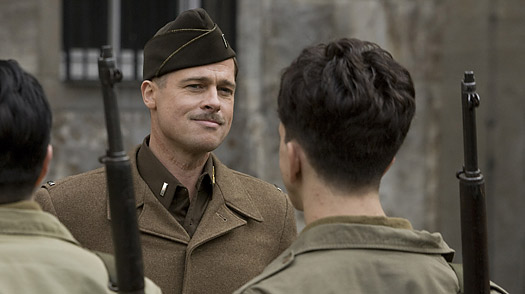
Brad Pitt in Quentin Tarantino's Inglourious Basterds
(2 of 2)
In one of the parallel story lines that converge late in the film, German Colonel Hans Landa (Christoph Waltz), a kind of supersleuth "Jew hunter" with a chatty, almost courtly demeanor, discovers and kills most of a Jewish family hiding in the cellar of a French farm. One girl, Shoshanna, escapes to Paris, where she runs a movie theater. She meets a young soldier, Frederick Zoller (Daniel Brühl of Good Bye Lenin!) who has become a battlefield hero and starred in his own military biopic, which is to receive its world premiere at Shoshanna's theater with top Nazis in attendance.
Double and undercover agents fill out the movie's other main plots. A German-born English officer, Lieutenant Archie Hicox (Michael Fassbender, of Hunger and Fish Tank), is sent by his OSS superior (Mike Myers in a low-key guest spot) to hook up in France with starlet Von Hammersmark, and thus get close enough to Hitler, Goering and Goebbels to kill them and end the war. (Two of the Reich's most beloved actresses, Zarah Leander and Olga Chekova, were later thought to be secret agents for the U.S.S.R.) Hicox and the actress rendezvous in a French bar, the setting for the movie's most artful confrontation, a tense game of wits between sham Nazis and real ones. (See pictures of Kristallnacht.)
The chatter is pure Tarantino. For all his notoriety as a director of complexly choreographed action, gore, car and dance sequences, what he really likes it to let people — meaning himself, as the screenwriter — talk. Inglourious Basterds is, after all, a war movie without a single scene on the front lines. No long tracking shots of soldiers crouching in foxholes or marching across an open field, aiming death at their enemies. Almost all the set pieces are conversations, or interrogations, usually involving Landa: with the French farmer (Denis Menochet), Shoshanna, Von Hammersmark and Raine. Some of these chats could use either punching up or scrupulous editing. In fact, on the basis of sheer entertainment value, this movie can't match the two hours Tarantino spent onstage in Cannes last year talking movies with French critic Michel Ciment.
In such a large cast, Pitt all but disappears into his mountaineer accent and laconic sadism; the other Basterds are mere war-film window dressing. This conflict is fought mainly between nasty Nazis and resourceful women. In her slinky dresses and fancy footwear (sometimes just one shoe), Kruger is steely glamour incarnate. And Waltz has the purring efficiency of a sleek German vehicle, not a tank but a Mercedes-Benz; he could take Cannes' Best Actor prize on Sunday night. The movie is pretty scrupulously played in the languages its characters would speak — except for one odd moment early on, when Landa tells the French farmer, "I ask your permission to speak English for the rest of the conversation." (He and the film have a reason for this.)
Tarantino, who finished his script last July, rushed the movie into and through production because he wanted it to be ready for this multilingual Babel of a festival. At the press conference, he said he loved Cannes because, here, "cinema matters. It's important. It means something here. All the world's film press are here. There's something about all of them seeing it at the same time. The cat is out of the bag for the Planet Earth. I am not an American. I make movies for the Planet Earth. And Cannes is about that."
Other directors might want to put a different interpretation on the film's climax: that the Nazis in the theater audience are like the critics watching Tarantino's film, and they deserve the same fate. But let's buy into Tarantino's lovely fantasy, of the festival and his new work, and say that a film can save the world. Just not this one.